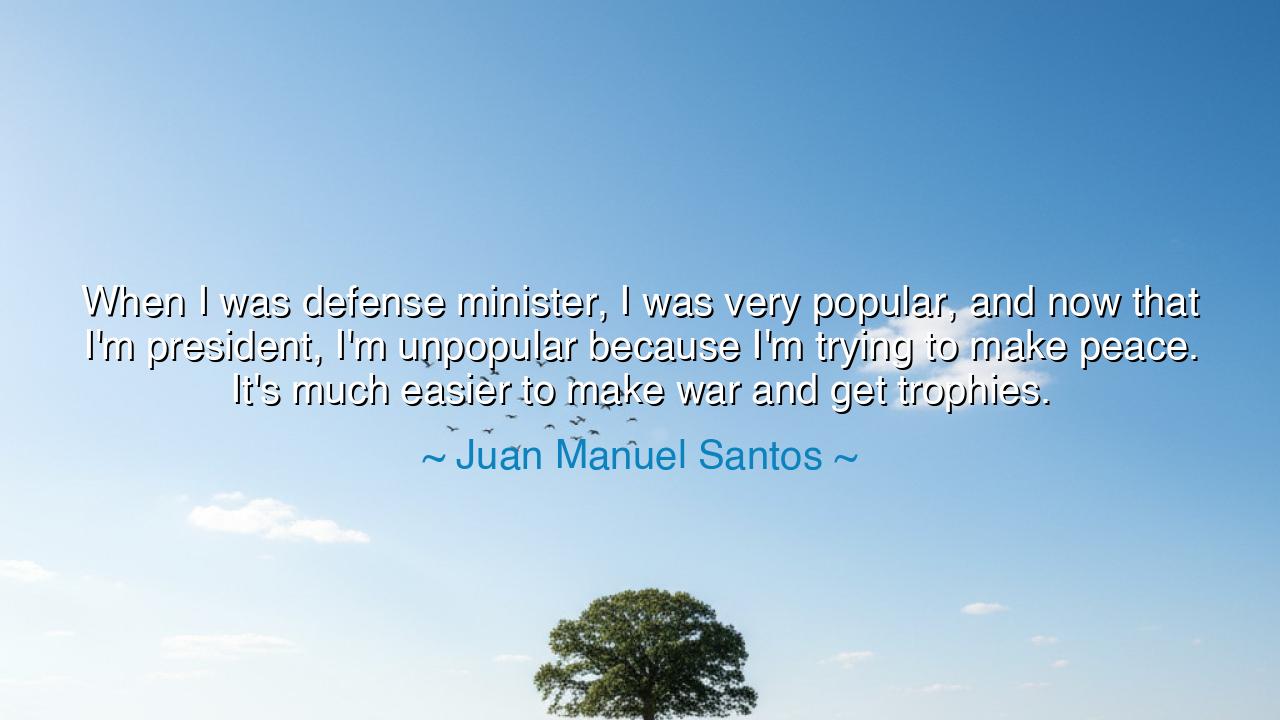
When I was defense minister, I was very popular, and now that
When I was defense minister, I was very popular, and now that I'm president, I'm unpopular because I'm trying to make peace. It's much easier to make war and get trophies.






In the words of Juan Manuel Santos, former president of Colombia, we hear a confession both paradoxical and eternal: “When I was defense minister, I was very popular, and now that I’m president, I’m unpopular because I’m trying to make peace. It’s much easier to make war and get trophies.” These words reveal a truth that rulers and generals across the ages have known but seldom admitted—that the path of war is often praised, while the labor of peace is met with suspicion, resistance, and scorn. For men are quick to cheer the clashing of arms, but slow to honor the quiet work of reconciliation.
The ancients spoke of this same truth. The poets sang of warriors crowned with glory, their names etched in stone, their victories celebrated in song. Yet who sings of the diplomat who prevented bloodshed, or the leader who laid down the sword? Santos reminds us that to make peace is harder than to make war, for peace requires patience, compromise, and humility, while war feeds the hunger of pride, vengeance, and ambition. It is easier to destroy than to heal, easier to divide than to unite. But only in the difficult labor of peace is true greatness found.
In his own life, Santos embodied this struggle. As defense minister, he commanded popular approval, waging relentless campaigns against guerrilla forces, dealing decisive blows that earned him the praise of his nation. Yet when he became president, he turned from the language of victory to the language of reconciliation, seeking dialogue with the FARC rebels who had bloodied Colombia for decades. For this he was reviled by many who had once cheered him, accused of weakness where he showed courage, of betrayal where he sought healing. His words reflect the loneliness of that path: war brings trophies; peace brings doubt.
History bears witness to this dilemma. Consider Yitzhak Rabin, who as a soldier and general was hailed as a hero of Israel, yet when he reached for peace with the Palestinians, he faced fierce opposition from his own people. His hand that once wielded the sword with honor was condemned when it extended in reconciliation. Ultimately, he gave his life for that cause, slain not by an enemy, but by one of his own. So too, Santos reminds us, the peacemaker often walks a road more dangerous than the warrior’s, for he challenges not only enemies abroad, but resentments within.
Yet the fruits of peace endure far longer than the spoils of war. A victory in battle fades with time, but the silencing of guns, the return of exiles, the rebuilding of villages—these echo through generations. The Nobel Prize awarded to Santos in 2016 was not for conquest, but for his courage in pursuing reconciliation. It was a recognition that the unpopular path may also be the noblest, that history’s true judgment favors those who heal rather than those who destroy.
The lesson for us is clear: do not mistake the applause of the crowd for the measure of righteousness. War dazzles with quick glory, but it leaves wounds that fester. Peace is slow, quiet, and often thankless, but it is the only soil in which a nation may truly flourish. Whether in politics, in families, or in our daily dealings, the courage to make peace is greater than the pride of winning battles.
So I say to you, children of tomorrow: honor not only the warriors, but the peacemakers. Learn that to reconcile is harder than to conquer, to forgive is harder than to strike back, and to extend the hand is harder than to raise the fist. Follow Santos’s wisdom: let your trophies be not the scars you inflict, but the lives you mend. For though peace may bring unpopularity in the moment, it brings eternal honor in the eyes of history and in the judgment of the soul.






TDBui Tien Dat
Santos’ comment is powerful, especially in the context of leadership and public opinion. War often brings immediate results that can make leaders appear strong, while the complexities of peace can feel like an endless struggle with fewer visible successes. How do we redefine success in leadership so that peacebuilding efforts are valued as highly as military victories? How can leaders be encouraged to prioritize long-term peace over short-term, visible achievements?
TLTrit Le
It’s really interesting to hear Santos reflect on the shift in his popularity as he moved from defense minister to president. His point about peace being less immediately gratifying than war makes me question how we, as citizens, view leadership. Why do we often reward leaders who take decisive, aggressive actions, but fail to support those who work toward peace, even if it’s a more difficult and long-term effort? How do we change this narrative?
SSSen Sen
I can understand why Santos feels that making peace is harder than making war, especially from a leadership perspective. War can provide clear, visible results, but peace requires patience, compromise, and persistence. How can politicians and leaders change the narrative to show the value of peace, especially when the rewards aren’t as obvious? Can peace ever be seen as a real victory, or is it always overshadowed by the pursuit of war trophies?
QPDo Quoc Phong
Juan Manuel Santos’ statement about the difficulty of making peace compared to the popularity of war is thought-provoking. It raises a valid point—war often provides clear victories and tangible rewards, whereas peace is a much more complex and subtle process. But does the public’s preference for action over diplomacy say more about their desire for immediate gratification than their willingness to work toward long-term stability? How do we shift public mindset toward valuing peace?